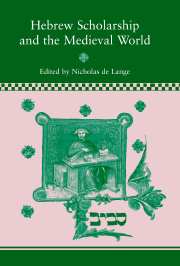Book contents
- Frontmatter
- Contents
- The contributors
- Preface
- List of abbreviations
- PART ONE NEW LINES OF INVESTIGATION
- PART TWO THE HEBREW LANGUAGE
- PART THREE PRAYER AND POETRY
- PART FOUR THE WORLD OUTSIDE
- 13 Hebrew apologetic and polemical literature
- 14 Biblical commentaries and Christian influence: the case of Gersonides
- 15 Jewish scholarship and Christian tradition in late-medieval Catalonia: Profiat Duran on the art of memory
- Bibliography of the writings of Raphael Loewe
- Index of names
15 - Jewish scholarship and Christian tradition in late-medieval Catalonia: Profiat Duran on the art of memory
Published online by Cambridge University Press: 21 January 2010
- Frontmatter
- Contents
- The contributors
- Preface
- List of abbreviations
- PART ONE NEW LINES OF INVESTIGATION
- PART TWO THE HEBREW LANGUAGE
- PART THREE PRAYER AND POETRY
- PART FOUR THE WORLD OUTSIDE
- 13 Hebrew apologetic and polemical literature
- 14 Biblical commentaries and Christian influence: the case of Gersonides
- 15 Jewish scholarship and Christian tradition in late-medieval Catalonia: Profiat Duran on the art of memory
- Bibliography of the writings of Raphael Loewe
- Index of names
Summary
Medieval Christian scholars were well aware of the tension between reading and remembering exactly what they had read. Petrarch articulated the quandary in a much-discussed passage in the Secretum (1347–53), a fictional dialogue between himself (alias ‘Franciscus’) and ‘Augustinus’, modelled after Augustine's Confessiones but in fact largely dependent on Ciceronian ethics and psychology. In Book II of the Secretum Franciscus and Augustinus pursue their analysis of the misery that comes with the Seven Deadly Sins. Within this context they review various intellectual habits that might lead to arrogance and thus conflict with prudence. One of these potentially harmful habits was reading, a custom which, though ultimately wholesome and beneficial to the soul, was not without its intrinsic problems.When Augustinus tells the author to go and find a remedy against his weakness in the books of Seneca and Cicero, Franciscus retorts that in fact he has read both but has forgotten most of their precepts. Books, he found, are a great help while you are reading; once you put them away, however, their impact disappears. Augustinus acknowledges that only too many nowadays pursue this kind of reading and hastens to offer practical guidelines as to how to memorize effectively the contents of one's reading. The belief that reading and memorizing were closely connected yet somehow incompatible had an ancient pedigree. In Plato's Phaedrus (274c–275b), Socrates formulated a critique of writing with the help of ancient Egyptian mythology.
- Type
- Chapter
- Information
- Hebrew Scholarship and the Medieval World , pp. 224 - 239Publisher: Cambridge University PressPrint publication year: 2001
- 2
- Cited by



